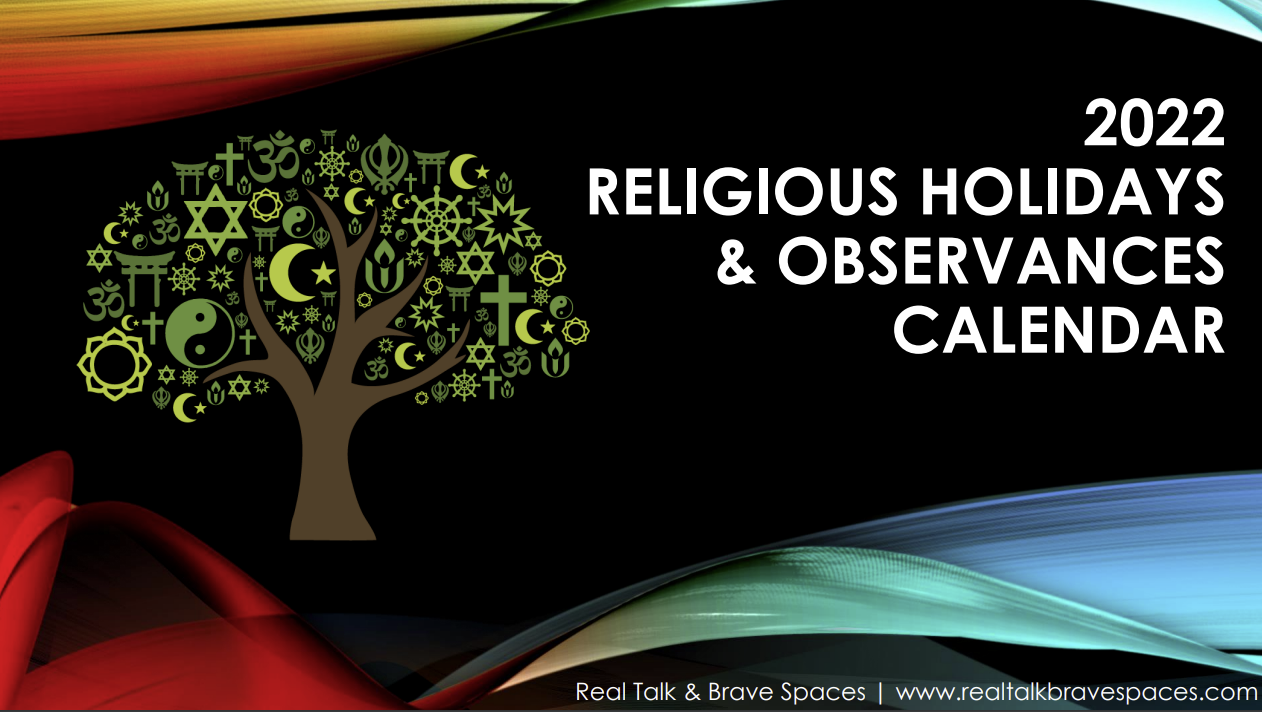A Calendar for Equity and Inclusion
Happy New Year! To kick off 2022, I’d like to bring awareness to an often overlooked dimension of Diversity, Equity & Inclusion: religion & spirituality. Many of us spend the end and the beginning of each year celebrating various holidays. So let’s take some time to explore the impact of religion/spirituality, how it impacts DEI, and steps we can take to be more spiritually inclusive.
“You’re Jewish, right? No? What about your husband?”
This is one response I received when raising awareness about the Harvest High Holy Days of Judaism. This individual is Jewish and was expressing deep gratitude and surprise because in the United States, he had not seen these holidays regularly acknowledge.
But he was also perplexed – why would I, someone who isn’t Jewish or directly connected to the community, put energy into raising others’ awareness of the High Holy Days?
The simple answer: empathy. While I am not Jewish, I am Muslim in the United States and have experienced and witnessed religious or spiritual marginalization.
One of the most impactful events of my life happened soon after I graduated college and started my first “real” job. A few months after starting this job, a director asked if I’d like to grab lunch. At this time, the 2008 United States presidential election was ramping up and this director (who identified as White, a woman, and a Baby Boomer) began to share with me how in awe she was as to how the country was transforming.
She couldn’t believe that over the course of her life, the country was able to go from the horrors committed during the Civil Rights Movement to actually potentially having the first Black president of the United States. As she pontificated her excitement for casting her vote for Barack Obama, she then looked at me and said “But…you know, he is Muslim,” as she shook her head in disdain and derision.
At that moment, I wanted to say three things:
1. “No, he isn’t.”
2. “So what if he was?”
3. “I am.”
But I didn’t say anything. I awkwardly smiled and covered because I figured if she was so comfortable sharing her distrust of Muslims with me, other leaders in the organization must feel similarly and if they were to know I was Muslim, it would impede my ability for success in the organization.
My experience is not unique, other Muslim friends and colleagues had shared other experiences of marginalization ranging from being questioned about certain practices like praying or attending Jummah on Fridays to explicitly being asked not to fast during Ramadan so as not to make other people uncomfortable.
As a result of experiences like these and countless others, the vast majority of us who do not practice the dominant religion of a particular country, often feel the need to hide, cover, or minimize our spiritual identity.
One of the most frequent ways this covering or minimization can manifest is via holidays. In the United States, we know that we can’t schedule meetings on December 24th or 25th due to Christmas. But do you know when Eid (Islam) is? Or how about Lunar New Year (Buddhism), Diwali (Hinduism), or Yom Kippur (Judaism)? Due to a lack of awareness of these holidays, which are roughly equivalent in importance to Christmas for Christians, many of your colleagues are forced to decide whether to attend that “important” meeting or spend the holidays celebrating with friends and family.
Where do we start?
No one expects you to be an expert in all religions and spiritual identities. But you may want to make an effort to expand your cultural literacy about faiths you may not have intimately come in contact with.
One easy way is to be more self-aware of various holidays – you could make it a New Year's resolution! Check out my 2022 Religious Holidays & Observances Calendar. This guide provides information about diverse cultural celebrations and religious holidays. It includes a brief description of the events, any restrictions associated with each event, and a calendar.
This resource can assist in internal event planning and external engagements. For example, you might not want to host an internal luncheon or dinner during a time of fasting or you might understand why an external partner is not as responsive as they typically are due to observing a holiday. In the calendar, there is a pro-tip on how you can add these holidays (and others) to your Outlook calendar.
I hope you find the calendar a helpful resource to support your diversity, equity, and inclusion efforts in 2022!

